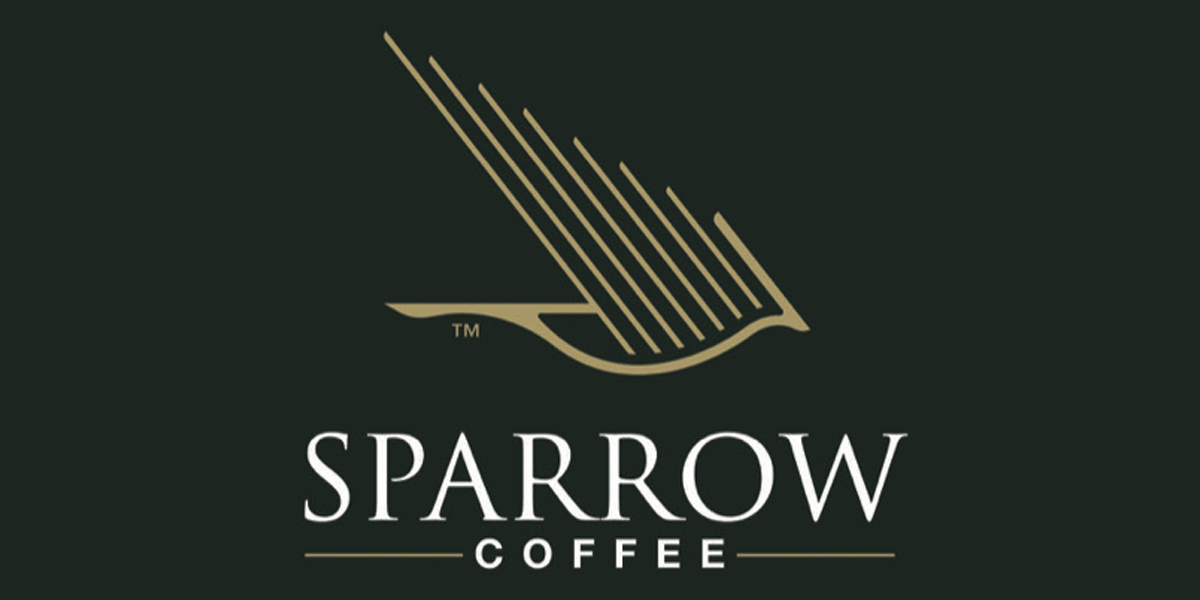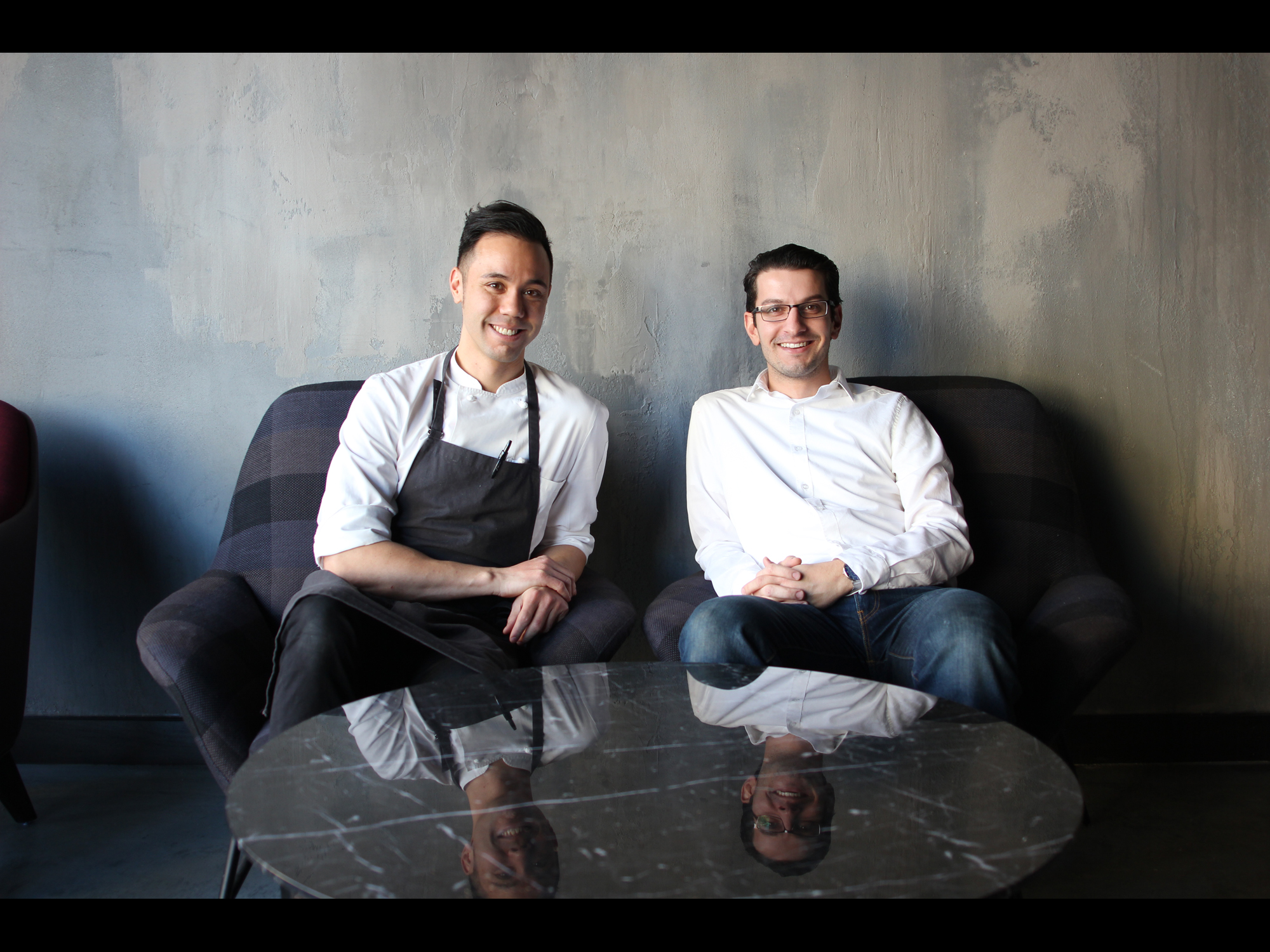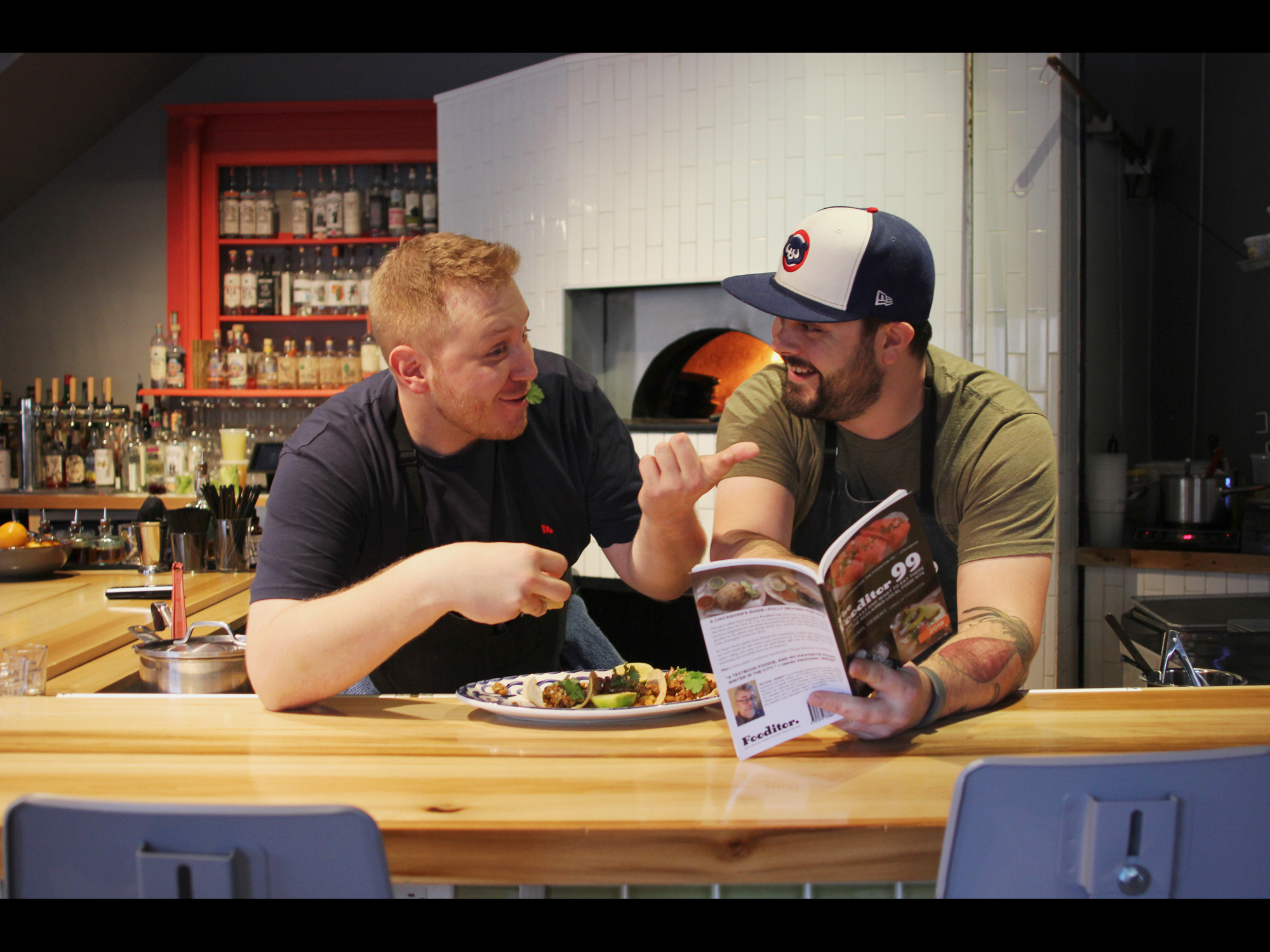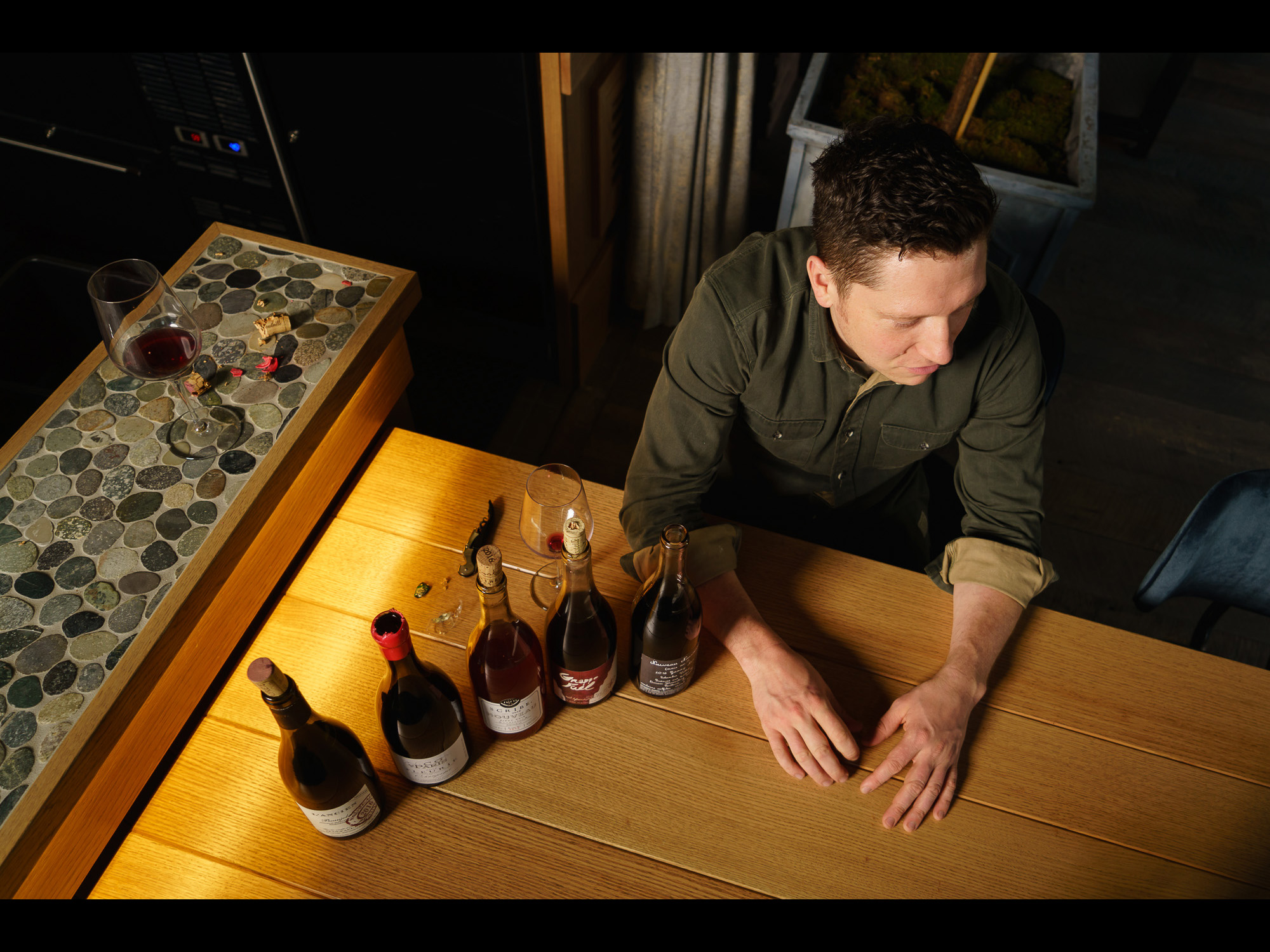WALKING FROM WHERE I PARKED TO The Press Room, the wine bar in the basement of the former Free Methodist Publishing House in the West Loop, I passed a number of buildings filled with vague-sounding internet businesses, as well as a Goodwill store, whose front rack displayed chinos in every imaginable shade of khaki.
I point this out because walking any other direction to The Press Room would have taken me past a bustling restaurant district—the sports bars on Madison, the chic restaurants of Randolph, Wishbone and the rising McDonald’s headquarters on Washington. Only coming from the west do you get the sense of a transitional neighborhood that hasn’t transitioned yet. Which by definition, makes The Press Room the outpost at the fancy West Loop’s frontier.
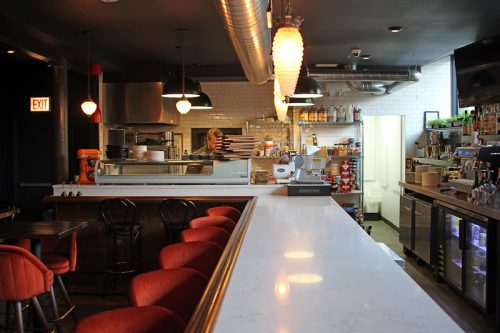
“It’s in the basement, but you can see the town from down here,” says owner George Saldez, who points out the window near the ceiling in which the Sears/Willis Tower is framed as perfectly as a picture. Saldez, a fuzzy-haired, raspy-voiced Australian, seems the perfect owner for a bar, in the sense of being someone who could throw a troublemaker out on his ear singlehanded. But as he talks, it becomes clear that that’s not the sort of bar that he intended to open, frontier or not.
“I’ve worked in the industry for twenty years, in Australia, Italy and now the U.S. I worked for Levy, at Bar Toma and at River Roast,” he explains. “A wine bar just seemed to fit down here—we felt there was a shortage of cozy little places.”
A couple of years from now, The Press Room may well find itself surrounded by big, decidedly uncozy places. But the entire building is an exercise in providing the smaller things a neighborhood needs before the giants take over. The 1909 publishing building was bought by another Australian, a former economist and his wife, Shawn and Kimberly Uldridge, and redeveloped with the design firm Siren Betty, who’ve done restaurants including Giant and Quiote. (As we’re speaking, Shawn is nearby with a drill, attaching stands to some new tables for the bar.) A bar for the basement, a hair salon (and the smell of shampoo) for the main floor, and the upper two floors are a very chicly modernist bed and breakfast, which immediately made me wish I was cool enough to live there. (The Uldridges are, and do.)
“I wanted to make it a great local, not a huge flashy place,” Saldez says. “The question is, do I feel comfortable where I am? People spend really decent money going out, you get let down by the service or you go in a place where you don’t feel at home. We have people coming down here and reading books. A lot of date nights, a lot of people who came here once and who’ve come back every week ever since.”
“It’s great not being on Randolph. I feel like we’ve had every single person in from the apartment building across the street,” says Jeff Williams, the wine bar’s chef.
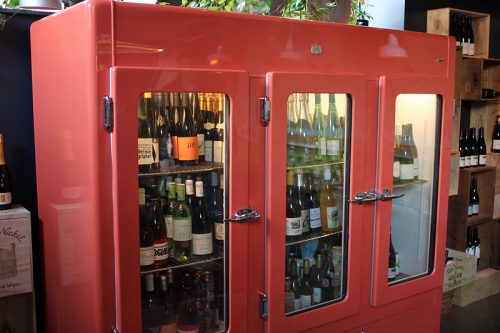
I ADMIRE THE MODESTY OF THEIR AMBITIONS in an immodest part of town, including the restraint displayed in making The Press Room not seem too designed or chic—its touches are mostly subtle, possibly excepting the restored retro refrigerator case, salmon pink, at one end of the room (“It has one temperature, cold,” says Saldez).
More typical is the patterned wood work on the face of the bar—which was repurposed from the walls: the basement at one point was a casket maker (hence the mural for an Australian cigarette brand literally named “The Casket”), and the wood pattern was made by its workers out of bits of casket scrap. A private dining room, where they hope to do events regularly, is closed off by an old fire door of battered metal, which slides into place with the immensely satisfying sound of a dungeon closing.
Saldez’s approach to wine—90% of the liquor sales, though they have a nice short cocktail list— is low-key and approachable. “Doing a wine bar, I want people to be able to experience and taste something they may have never had. A lot of people walk in and they’re going to say their usual thing, Napa Chardonnay or Cab Sauv, but maybe we can suggest something else to try. It’s not so much educational, but opening your horizons a bit.”
A wine bar just seemed to fit down here—we felt there was a shortage of cozy little places.
“I choose wines based on, are they balanced? Obviously we want wines that you can’t find at the local store, we work with many different distributors. The challenge is, this is something I like, what I think will work, but then you open the door and see what happens.” There’s no specific region he focuses on—”I’m half-Argentine and half Swedish, my parents came to Australia and my wife’s half-Irish, so we never get focused on one spot.” But he admits, “I’m loving wines from Spain. I have a couple of wines from the Canary Islands, they’re really nice and at a great price point. But it’s not just about what I like, but does it fit.”
“Starting a list from scratch is an interesting place to be,” he says.
I ask if he’s offered anything he loved but customers just didn’t go for, and Williams offers an answer. “We had a couple of Syrahs, super-organic, biodynamic, funky wines that drank more like a beer than a wine. People just didn’t get them.”
Williams is similarly modest when it comes to the food side. At first he tells me his background in Chicago was Sable and Iliana Regan’s short-lived Bunny the Micro Bakery, and refers vaguely to having worked in New Orleans and “a few places in Europe.” I quiz him later and learn that one of the places in Europe he staged was Fäviken, the remote, hyperlocal Michelin two-star in Sweden, and he also did a stage at Washington’s similarly acclaimed, foraging-based The Willows Inn on Lummi Island. Now he’s running a tiny kitchen “with two induction burners and a little convection oven.”
“Wine friendly is pretty much the first thought— don’t do anything too spicy or too against the grain,” he says. “In the fall we got more Spanish, a little North African in flavor—my fiancee’s dad lived in Cairo and now lives in Dubai, so I fell in love with spices of that region.”
“I’m an Australian so I wanted to do a meat pie,” Saldez chimes in.
“But even then, we didn’t just do ground beef,” Williams says. “We took Slagel beef short rib, and did it sous vide for three days.”
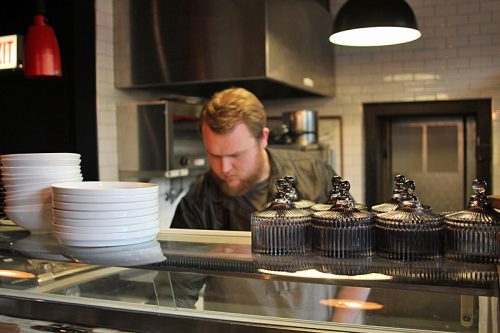
A lot of the menu, and what a lot of people order from, is the cheese and charcuterie list. “We get the cheese from Pastoral and the Great American Cheese Collection. The meats we get from all over the country, through Fortune Foods and West Loop Salumi,” Williams says. ” We try to do a tasting with cheese and meat purveyors every other week.”
“We line them up our wine tastings, and make an afternoon out of it,” Saldez laughs.
It seems like a good life, a good place to enjoy life in this busy area, very different from the sports bars along Madison nearby. “I do have a TV, but it’s never on, we’ve had one person ask to put on a football game,” Saldez says. “It’s got a really nice, subterranean, garden, wine…” he trails off mid-adjective.
“It’s cozy. Yeah, it’s cozy,” Williams completes the thought. “My favorite comment from a customer is, we feel like we’ve been here for 30 years, but are still relevant.”
Michael Gebert is always looking for a cozy place to be editor of Fooditor.
Latest
Join the Discussion
After you comment, click Post. If you're not already logged in you will be asked to log in or register with Disqus.




